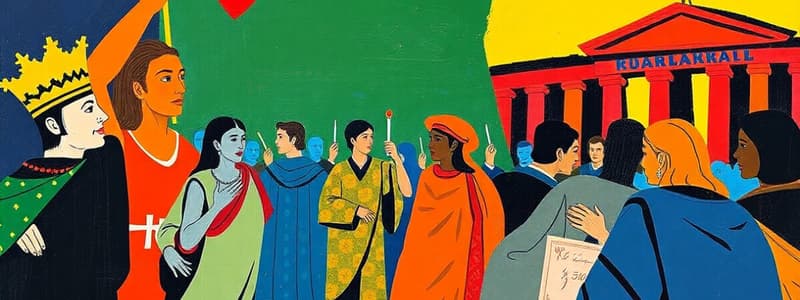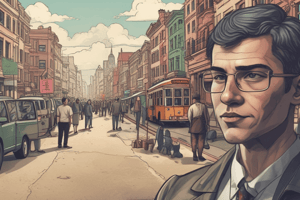Podcast
Questions and Answers
What is the primary role of the Senate in ancient Rome?
What is the primary role of the Senate in ancient Rome?
- To represent the interests of the general populace
- To elect consuls annually
- To control public finances and shape foreign policy (correct)
- To serve as a judicial body
Which form of government allows citizens to directly participate in decision-making?
Which form of government allows citizens to directly participate in decision-making?
- Direct Democracy (correct)
- Monarchy
- Oligarchy
- Republic
What was the significance of the Magna Carta in England?
What was the significance of the Magna Carta in England?
- It limited the powers of feudal lords
- It required kings to follow the law (correct)
- It replaced the monarchy with a republic
- It established a direct democracy
Which term describes the mechanisms preventing any one branch of government from becoming too powerful?
Which term describes the mechanisms preventing any one branch of government from becoming too powerful?
What was the role of consuls in the Roman Republic?
What was the role of consuls in the Roman Republic?
What defines a citizen in a community?
What defines a citizen in a community?
Which of the following statements about checks and balances is accurate?
Which of the following statements about checks and balances is accurate?
What was the primary function of the agora in ancient Athens?
What was the primary function of the agora in ancient Athens?
What role did barons play in the political structure of medieval England?
What role did barons play in the political structure of medieval England?
What was a key feature of the Roman Republic?
What was a key feature of the Roman Republic?
Flashcards are hidden until you start studying
Study Notes
Citizenship
- A citizen actively takes on ethical responsibilities within a community.
Checks and Balances
- A system used to prevent any branch of government from becoming too powerful.
- Each branch of government has the power to monitor and influence the others.
Direct Democracy (Athens)
- Citizens directly participate in decision-making and legislation.
- The assembly in ancient Athens allowed eligible citizens to vote on laws and policies.
Agora (Athens)
- The central public space in ancient Athens.
- Used for assemblies, markets, and social gatherings.
- Served as the heart of political and civic life.
Republic (Rome)
- A system where the country is considered a "public matter".
- Power is held by elected representatives and an elected leader.
- This contrasts with a monarchy, where power is held by a single person.
Consuls (Rome)
- The highest political officials in the Roman Republic.
- There were typically two consuls, serving both as military commanders and chief executives.
- They were elected annually by the citizens.
Senate (Rome)
- A political institution composed of appointed members.
- Advised the consuls, controlled public finances, and shaped foreign policy.
Barons (England, Europe)
- Feudal lords who held land directly from the king.
- Played a crucial role in the signing of the Magna Carta.
- The Magna Carta limited royal power and protected the rights of Barons.
Kings (England, Europe)
- Monarchs who held absolute power in the monarchy.
- Their authority was later limited by the Magna Carta.
- The Magna Carta established that kings must also follow the law.
Citizenship
- A citizen is someone who takes responsibility for ethical behavior within a community.
Checks and Balances
- A system where different branches of government can monitor and limit each other's power.
- This prevents any one branch from becoming too powerful.
Direct Democracy (Athens)
- Citizens directly participate in decision-making and lawmaking.
- The assembly in ancient Athens allowed eligible citizens to vote on laws and policies.
Agora (Athens)
- A central public space in Athens.
- Used for assemblies, markets, and social gatherings.
- The heart of political and civic life in ancient Athens.
Republic (Rome)
- A system where the country is considered a "public matter."
- It features elected representatives and an elected leader.
- This contrasts with a monarchy, where power is held by a single person.
Consuls (Rome)
- The highest political officials in the Roman Republic.
- Typically two consuls served at a time.
- They were both military commanders and chief executives.
- Elected annually by the citizens.
Senate (Rome)
- A political institution in ancient Rome comprised of appointed members.
- They advised the consuls, controlled public finances, and shaped foreign policy.
Barons (England, Europe)
- Feudal lords who held land directly from the king.
- They played a crucial role in signing the Magna Carta.
- The Magna Carta was intended to limit royal power and protect the rights of the barons.
Kings (England, Europe)
- Monarchs who held absolute power in their monarchies.
- The Magna Carta eventually limited their authority.
- The Magna Carta established that even kings must follow the law.
Studying That Suits You
Use AI to generate personalized quizzes and flashcards to suit your learning preferences.




